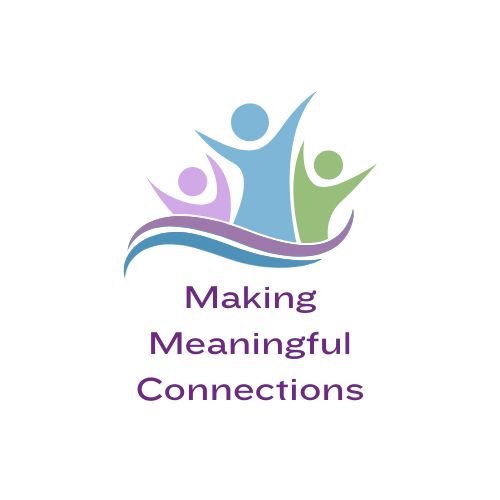
by Barb Abramson | Aug 5, 2015
My husband and I are learning what it means to tread water. Not literally, but we are leaning to stay afloat and together when there is no rescue in sight.
It’s been a rough couple of weeks. Our house was struck by lightning, leaving a ragged hole in the chimney and frying out the wiring in our home. Our 11-year-old miniature schnauzer contracted diabetes a few months ago and as the doctors warned us could happen, went blind. Tragically, he passed within a week of the lightning strike. The stress of not being able to see, being in several different houses before we moved to a hotel and other medical complications were too much for him and he shut down. To add to the frustration, two trusted advisors see our retirement financial plan differently which adds to the confusion.
So our heads are spinning. We’re distracted by too much on our plates; me, managing more than one business and working with clients, and my husband, trying to coordinate contractors and the insurance company while taking care of his customers. In other words, we are stressed!
The easiest thing for us to do is take our frustrations out on the closest person in our lives, physcially and emotionally. For us that usually happens to be each other. But that easily could also be our son, or best friend, or whoever is within breathing distance on a bad day.
It’s not that we intend to be mean or inconsiderate. Stress can turn the nicest of people into mud-slinging, insult-throwing, mean-spirited monsters. The words and actions can just bubble up from inside and then explode.
This is not normal behavior for either of us. We are generally thoughtful, happy people. So when we hit the wall of overwhelm, one of us can often morph into a version of ourselves that we don’t recognize and it can put stress on the relationships that we hold most dear. The saying, “We always hurt the ones we love,” comes to mind, but it makes sense. Those are the people in our lives that are closest to us and we feel safe in some way unloading our pain, sorrow and anger with the world on them.
These bursts of frustration can damage even the best relationships, steadily chipping away the love and trust. While one spouse or partner may feel safe lashing out, it is a safe bet your “loved one” doesn’t feel safe being around you, not knowing when the next emotional explosion is headed their way.
Communicating is key in any relationship and we work at it every day. Hurtful words and actions can be destructive and we work to make choices that avoid that path.
Here are 5 ways we learned to keep our cool and our relationships healthy
Think Before You Speak
Yes, take a deep breath. It’s the obvious method that most have heard about, but it works. Breathing deeply calms our nervous system and enables us to slow things down for a moment and find balance. It is like the refresh button on the computer.
Taking three deep breaths works even better and about equals the timeframe of counting to ten. It gives us space to gather our thoughts and speak them effectively and kindly, versus from a place of anger.
Divert Your Mind
Take a time out. Focus your energy on something else. Physical activity such as working out often helps disburse the negative energy. Or you might choose a creative outlet. Meditating can take your mind to a non-judgmental place, where you can tune out from your stressful thoughts and feelings and calmly explore solutions. For me, a long walk listening to an audio book on my phone takes me to another realm, while my husband heads to the bowling alley to work on his game.
Regardless of what attracts and inspires you, putting your attention in another direction allows space, time and energy between you and your loved ones.
Chill With Great Music
There is lots of research showing music calms and soothes the soul as well as lowers blood pressure. Our emotions respond to music, so it’s no surprise that music can decrease our stress hormones. It can also raise our energy and calm our senses. You don’t have to listen to smooth jazz or classical, (unless that is your preference,) just find the kind of music that feeds your soul.
Look For Humor
You have probably heard the saying, “One day we will look back on this and laugh.” There are parts of our situation that will never be humorous , for us losing our sweet dog is one of those. There are others that we will likely be laughing about in time – what’s the big deal about a hole in the chimney when we live in Florida and we might get cold enough for a fire one or two weeks a year? Sometimes we can find the humor in the situation and laugh now. It’s all a matter of perspective. Laughter relieves stress, soothes tension and is a natural muscle relaxant.
Ask For Help
Sometimes the hardest thing to do is to admit when we need help, but it is one of the most effective ways to move through a process. But who do you ask?
Start with the people you love most. The shift of asking for help versus lashing out builds the relationship and opens lines of communication. Let them know you are frustrated and needing each other’s help to sort the situation. This changes the paradigm from attacking each other to building a bridge together.
Maintaining healthy connections with others, especially those we hold in our hearts takes work, positive communication, and sometimes a little space away that allows us to rejuvenate and regroup.
Admittedly, sometimes my husband and I both get really tired and overwhelmed dealing with a problem we are facing, but facing it together takes some of the burden off both of us, strengthens us and helps us to find the laughter.
Originally published on The Good Men Project
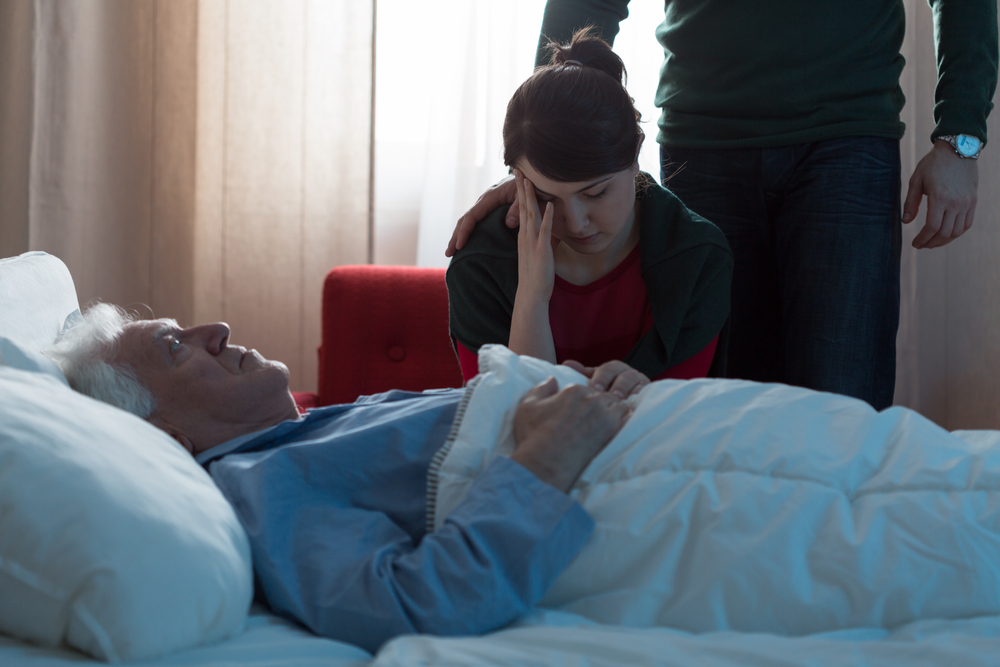
by Barb Abramson | Jul 20, 2015
Four years ago I made a decision that still haunts me. A decision that would change lives forever. His would be ended. Mine would be empty without him.
Guilt. It is something I have been holding in my heart since that day. Did I make the right decision? Could I have done something different, made another choice, gone in a different direction, tried something else?
Some will say taking him to Hospice was the humanitarian thing to do. I allowed him to die with dignity. I signed the papers that gave permission to inject him with a sleep-inducing , until many days later, he drew his last breath. It took much longer than it did when I took my beloved dog Scooby to the vet, but it felt the same. It felt like I had put my dad down.
My dad was a very kind and gentle man. Hel loved tooling around in his garden, playing bridge, and solving puzzles. He had a dry wit that I loved and to this day I smile thinking about his silly jokes.
He beat Leukemia, followed by a nasty bout of shingles. He worried deeply when Mom had a heart attack and she barely survived open-heart surgery, contracting MRSA while still in the hospital. The rest of her life involved daily struggles with diabetes, kidney failure, and congestive heart failure. Dad felt pained giving her insulin shots. It weighed on him heavily.
He took care of her the best he could until he couldn’t any more. Dementia crept in, and then Alzheimer’s. Too many things were falling through the cracks, and changes had to happen. First I hired in-home care for a little help with laundry and cooking, while I sorted out the bills. It turned out it wasn’t enough.
Years before, my parents went on a trip, dawdling around the country for the summer, I asked my dad to give me power of attorney and to be their health care surrogate – just in case. I paid their bills while they were gone, knowing that if anything happened to them on the road, I could make necessary decisions on their behalf.
With Mom and Dad’s health in jeopardy in their later years, having those documents allowed me to help them live better lives. It also allowed me to uproot them from the home they loved for 37 years and place them in an Assisted Living Facility, sell their home and make decisions for them that I know they didn’t agree with. I told myself I was doing it for them. They could no longer take care of their home. Dad had taken out a reverse mortgage and was tumbling into debt. I was struggling to pay their bills, and their self-care was going downhill fast. The food in the fridge was spoiling. So many things were going wrong every day and I was alone trying to help them and was exhausting my solutions and myself.
Walking through the grocery store one evening in tears, trying to figure out what to make them for dinner, I realized that I was falling apart. Mom needed insulin four times a day, and their life and mine felt turned upside down. Two weeks later, I moved them to an Assisted Living Facility and I know they resented it deeply. From a three bedroom, two bath house with a full kitchen and back yard, they were now crammed in a one room studio apartment because it was what they could afford. I sold their house paid off their debts and spent the next four years watching them both decline. Mom physically and Dad mentally.
As Mom continued to struggle with her health issues, Dad drifted into his own world. Sleeping was his escape from the fear of what was happening to both of them.
Becoming the parent of your parents is one of the hardest things. I had to make the decision to sell his car. He never understood that he was no longer safe on the road, even though he had failed a road test. Dad said he slept to escape his sadness and frustration. I have trouble sleeping sometimes feeling I contributed to much of it.
When Dad became too disoriented for activities of daily living according to the ALF, I moved him to the Alzheimer’s ward. I think it confused him even more, not being with mom and I know it broke my mother’s heart. She died six weeks later; I think she gave up.
I never told Dad that Mom had passed, another decision that festers in my heart. He was struggling with his own mind, not knowing who people were although he did know me. I just couldn’t bear to add sadness to his journey.
Then Dad contracted C. diff (Clostridium difficile), a bacterium that can cause symptoms ranging from diarrhea to life-threatening inflammation of the colon, and ended up in the hospital and then a nursing home for rehab. He couldn’t come back to the ALF until he was cleared of the contagious bacteria. I watched him decline more each day, both mentally and physically. There were many sleepless, tear-filled days and nights.
Finally, he was cleared to return and go back to his shared room. He was barely eating, and continued to lose weight. Sometimes he would eat a little for me, but he was now sleeping almost 20 hours per day. The ALF recommended I call in Hospice to help him. It was so confusing and overwhelming. I wasn’t ready to let him go. I sat by his bed for hours, begging him to wake up and eat. By the second or third night, he was breathing heavy. Hospice said I could sit with him all night as he was transitioning, but I couldn’t wrap my head around what was being told to me and I called 911 to take him to the hospital.
Dad was severely dehydrated by then, but within 45 minutes of a saline IV, was suddenly alert and talking a little with me. I was kicking myself. Dehydration – that was all it was. I could have made a horrible decision. The hospital admitted him for a few days and although confused, he was doing better and the physical therapy staff even got him up and waking a little in the halls.
And on one of the walks, he had an accident and lost control of his bowels. I was more upset than he was. Alzheimer’s is both a blessing and a curse. The hospital insisted on testing for bacteria and sure enough, the C-Diff was back and more serious than before.
The doctor quickly went from – “He can go back to the ALF” – to “He will likely never recover from this.” His body was weak, he was nearly skin and bones and my heart sank.
My father had been sleeping most of the day. He moaned and groaned a lot, whether from physical pain or emotional, I wasn’t quite sure. And then in a moment of lucidity, he opened his eyes and reached out his arm for me. I quickly moved over to sit by him on the bed and he looked at me and said, “I love you” and then closed his eyes and slept again.
I left the hospital that night in tears, knowing that I couldn’t send him back to the nursing home. And I couldn’t send him back to the ALF. During his three-week stay there he had declined rapidly and it was not an environment I wanted him to spend anymore time at. I arranged and met with the Chaplain at the hospital to help me with my decision. It didn’t matter that I was Jewish and he was Christian. It wasn’t about how you prayed, it was about faith and comfort – and my guilt.
Two days later, my dad was moved to the Hospice Facility. Moving him woke him up and he came into the building on a stretcher, sitting up and fairly alert. I panicked. “Wait – Dad is alert. He’s back. It’s ok. We don’t need to be here!” The staff took him to his room and settled him in bed while they took me on tour. I told them he didn’t walk any more, he was too weak and suddenly he was trying to climb out of bed, wanting to check out the room, the bathroom, wanting to know, “Is that a TV?” I don’t think there is a scarier rollercoaster than the one my emotions were on.
My heart was pounding. Dad settled down and then looked at me and waggled his index finger. “You’re a good Daughter,” he said. Those were the last words he spoke to me. He closed his eyes and drifted off to sleep and a short time later the nurse came in, morphine in hand. I spent the next four days by his bedside talking to him, soothing him, telling him I loved him and finally, telling him that Mom was waiting for him. An hour after I left on that fourth day, he passed.
I still hold on to the thoughts of did I do the right thing, did I do enough, and did I have the right to make the decisions I did.
I have told myself that my dad died with dignity and I helped make that happen. But as it is with every Father’s Day, my heart is still heavy.
Originally published on The Good Men Project
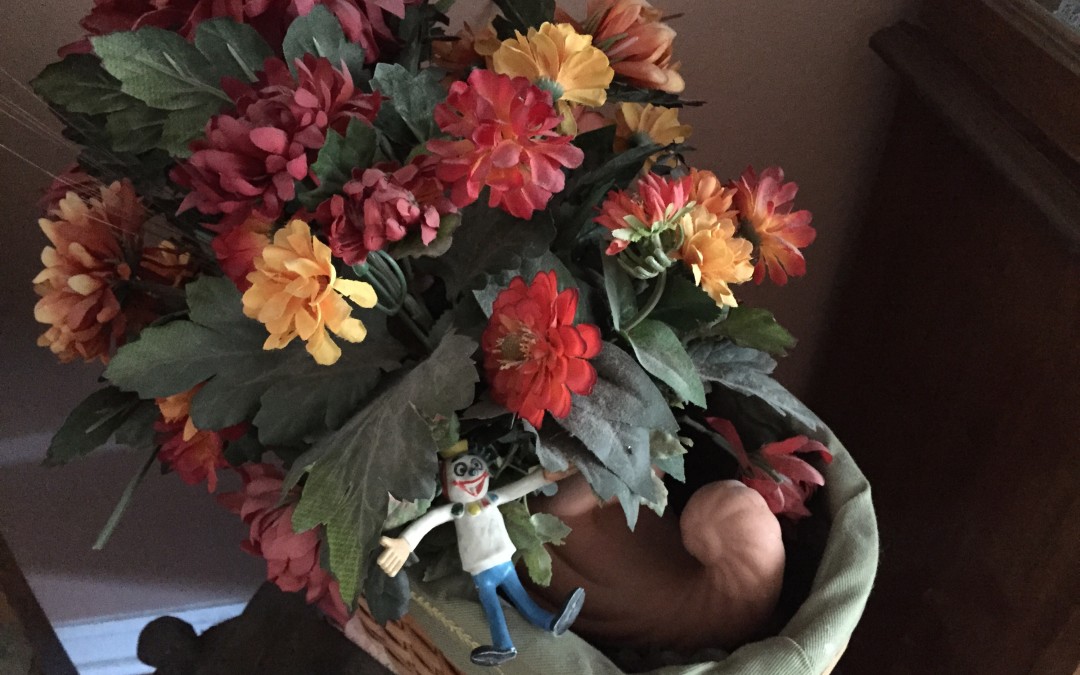
by Barb Abramson | Jun 9, 2015
When I was a kid, my mom and I played a game. We hid a little rubberized clown named Bendable Buddy around the house in odd places for the other to find. Whomever hid him last often heard peals of laughter and knew instantly he had been discovered.
We tried to be clever with our hiding places. I tied him to the blade of the ceiling fan. Mom squeezed him in the egg carton. It was so much fun trying to outwit each other. Sometimes we caught each other in the act and had to abandon our plan. The hilarity continued for years.
I moved out when I was 18, but still lived in town. Mom of course was a frequent visitor and so was Bendable Buddy. She would sneak him in; on the lookout for a covert spot, me pretending I didn’t know what was going on. As soon as she left, the search began and still giggling over the cleverness of wherever he was discovered, I would call her so we could share the joy of our ritual. And then I always made sure he always found his way home to her again!
Bendable Buddy was quite the traveler too. His early journeys included Canada, around the United States and a Caribbean cruise, stowed away discreetly in my suitcase. I sent him to the Bahamas with her and dad. The search for him became as much of a game as hiding him.
I hadn’t thought about Bendable Buddy in a long while. He had been packed up with all my parents belongings that were stored in my garage when they moved to an Assisted Living Facility nearly a decade ago. Mom had been ill several years before that and no longer drove. The game had not been on our radar for some time.
After my parents passed away, most of their things were brought to my home, boxes and boxes of memories stored in our garage. I still haven’t been able to go through all the boxes. There are some memories I’m not prepared to deal with yet.
Then he appeared on day. I found him inside a drawer in a rolling cabinet in my kitchen that my dad had made, tucked in next to the silverware. The tears flowed and I broke out in a huge grin at the same time.
For weeks he sat on my dresser, his happy face greeting mine every day. Bendable Buddy may be just a toy to some, but to me he is a an important memory I shared with my mom. He reminds me of silly mother-daughter times, giggling and feeling loved. He helps me remember the twinkle in my mom’s eye and her beautiful smile and, how much I miss her.
Memories are powerful. They evoke so many emotions. But most importantly, they connect us to the people in our lives and the events we experience. They tell the tale of our past and shape our future too.
Our stories are composed of our memories. They are created with family or friends, or our own private journey. They bring joy, evoke tears and fill our heart.
Silly old clown. I’m so glad I opened that drawer.
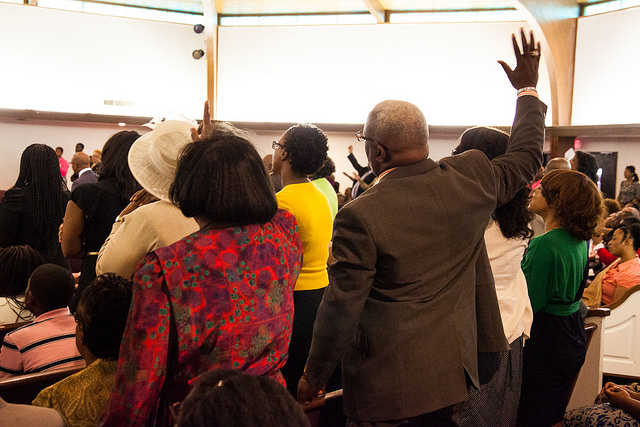
by Barb Abramson | May 17, 2015
On the four-year anniversary of my father’s passing, I attended a funeral. Well, I woke up that morning thinking I was going to a funeral. Instead, it was a celebration of life and a celebration of which I had never experienced before.
To put it in context, I am Jewish. In Judaism, we have special rituals, as do many other religions. We bury the dead within three days and sit Shiva in our homes for seven days. We don’t have viewings, we bury in a simple box, the body lovingly washed and then wrapped in white gauze by members of a ritual committee. There are no flowers as the origin of them was to perfume the bodies in cultures where the burial happened at a later time.
I lost both my parents four years ago within three months of each other. Attending funerals still makes me feel like I can’t breathe, my chest tightens up and I ache inside. But this day, for the most part was different and there was healing for me wrapped up in a different culture and the strong and beautiful connections I witnessed between the family, the congregation and the clergy and choir.
The service/celebration I attended was at the EBON (Everlasting Believers of the Nazarene) Temple. There was an open viewing the night before and that morning of the funeral, and lots of flowers. There were Deacons and Pastors, some visiting from out of town as well as a full choir and musicians playing the organ, electric guitar and drums. The family wore white, as did a group of women called the Mothers of the Church. The church was not elaborate, but the energy emanating from the pulpit and the congregation was moving, literally. People were on their feet, waving their hands, and singing praise.
The Pastor belted out The Lord’s Prayer, backed up by the choir. There were AMENS shouted out from those in attendance. There were testimonies from friends and memories shared from his adult children, all ending with “we know we will see you again.”
And then the Pastor gave his prayer, which felt like a sermon and testimony combined. The choir hummed and the musicians accompanied and the congregation swayed along. It was moving. It was stirring and it was riveting. It was a cultural encounter that I had not experienced and I could feel the love and compassion inside the building, but more so, throughout the community that was supporting the family.
It was a celebration of life. Three big-screen TVs, two hanging on either side of the pulpit and one over the entrance so those on the pulpit could also see, showed family photos throughout the service. When the pastor spoke, Psalms and Bible verses appeared on the screens. I have not been in a lot of churches, but knew instantly that technology was being used in this church in a way I had not seen before and was another link to connecting members with each other.
What finally brought me to tears and took me back to my losing my dad, was the military salute. I felt like I had left my body as I watched the two service men march slowly in their deliberate cadence and remove the flag over the casket, fold it and present it to his wife, and then two more to his children. I felt transported in that moment to four years ago when a flag was handed to me as the soldier looked me right in my eyes, thanking me for my father’s service.
Despite the celebration of life, there is still a family in mourning, missing a wonderful man, husband and father who impacted others in a positive way, as so many shared that day. I know their church community as well as friends and colleagues will rally around them. I felt honored to witness the connections they had with each other.
Before I left, I hugged his wife, whom I have known for several years and shared with her a piece of my culture. In Judaism we say, “May his (her) memory be a blessing.” I already know from what I witnessed, that it is.
Photo: Flickr
Originally published in The Huffington Post

by Barb Abramson | Apr 3, 2015
The four-year anniversary of losing my mom brought expected tears. There were also smiles and an overwhelming sense of gratitude for all she instilled in me.
She didn’t have the easiest life. Her mom was always sick and eventually went blind from Type 2 Diabetes. She dropped out of school in the 10th grade to care for her. When her three siblings all married and moved away, she continued to care for her mother until she met my dad in her mid-twenties and moved my grandmother to a nursing home. The birth of both her children were difficult; she endured 36 hours of labor with my brother, and lost nearly 30 pounds while pregnant with me due to asthma, which she suffered from for the rest of her life.
Although she was not a risk-taker and often saw the negative aspects of a situation first, I could not have had a better role model than my mom.
Here are three reasons why.
1. She Taught Me Determination
Mom was left-handed when she started school and at that time, left-handed children were judged as being wrong and different. She was forced to switch to writing with her right hand, which she says caused her to stutter for years to come. It was something that always made her self-conscious and affected her self-esteem. Yet, if someone threatened one of her children, “Mama Bear” came to life and any personal fears she had disappeared. My older brother also started school left-handed and when the school system tried to switch him over as they had done to her, Mom was in the principal’s office giving him a piece of her mind.
While communicating verbally was challenging at times, she easily expressed herself with art. I have memories of many oil paintings she created and a few hang in my home today. Although she never felt confident about her talent, she was good. But more than anything, her determination to live for eight years following a major heart attack, coupled with diabetes, kidney issues, congestive heart failure and MRSA contracted in the hospital reminds me how possible it is to fight through adversity.
There is always a path to the goal and a way to make something happen. Mom taught me that.
2. She Taught Me To Help Others
From a very young age, I remember my mom reaching out to others in need, often volunteering behind the scenes. She invited every stray to holiday celebrations — people who had nowhere else to go — and called the local colleges and Navy base to invite students and service men or women who had no family or friends to be with. She would even send my dad to pick them up. Mom didn’t know how to cook for just four, the size of our family. She excelled at cooking for 30, so we <em>always</em> had lots of leftovers!
My mom was kind to everyone. She never expressed racial or religious prejudice to me. She was a peacemaker through and through, and even when family members would not speak to each other, they always had a good relationship with her. She loved to gift friends with her crafts and cooking, showing me that it isn’t always about buying gifts, but sharing your heart.
3. She Taught Me To Love
I never doubted for one minute my mom loved me. She literally told me every day. As a child, I never left the room or went to bed without a hug and a kiss. And she always asked me, “Do you know how much I love you?” It was important to her that I knew that. On the day she died, it was one of the last things she said to me.
My parents walked through grocery stores still holding hands after 50-plus years of marriage. Although she had many medical issues that contributed to her death, I know seeing my father with Alzheimer’s broke her heart. I still have three voicemails on my phone I can’t delete because I am afraid to lose her voice, but in every one, she asks how my father is. (He had just been moved to the Alzheimer’s section of the Assisted Living Facility they lived at). The day before she died, I took her to see him. I could see how painful it was for her and for the first time, she asked to leave. She couldn’t bear it any more.
The lessons my mom instilled in me have gotten me over some tough hurdles in my life, including caring for her during her illness as well as dad’s. He passed away three months after her. I am grateful for those lessons. I have channeled my inner Mama Bear to protect my “cub” when need be. I love having big dinner parties and inviting people who have never met each other, to connect and become friends. I volunteer and try to smile at everyone I meet. I am grateful that I grew up seeing the good in people and I have a great capacity for love. I am one of those moms who is guilty of saying the same things my mom said. Happily guilty in this case. My grown son absolutely knows he is loved. I make sure to ask him often!
Originally published on The Huffington Post
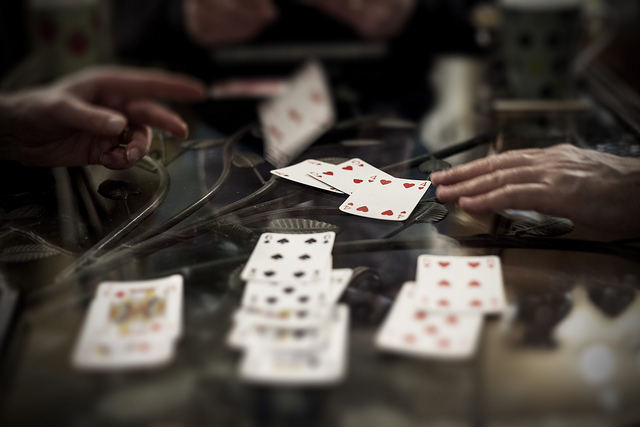
by Barb Abramson | Mar 16, 2015 |
I am sitting in my favorite chair, listening to the birds chirping madly away in their morning reverie and thinking of my dad. How he loved the birds that played in his back yard. He constructed feeders for them and would point out the cardinals and blue jays that would swoop in to eat, competing with the squirrels that thought the food was theirs.
I have so many great memories of times with my dad. He loved puzzles, road trips, cracking jokes, silly puns, and gardening. I love all those things too and truly wish I had spent more time with him in those activities.
Moving my parents to an Assisted Living Facility was life changing for both of them. The backyard birds, the gardening, their car, and many of the things dad loved went away. I left the bird feeders up at their place, but now wish I had brought them to my house.
When someone you love is ill, as my dad was with Alzheimer’s, you often forget about maximizing the time together. It’s easy to get caught up in caring for them while you are still running around maintaining your own schedule and busy life.
If I could spend some more time with my dad, I would carefully maximize every moment, even if it meant just hanging out together enjoying each other’s company.
Here are 3 things I wish I’d done to make most of my time with my dad.
Preserve the Memories
Journal their stories, or record an audio or video version. I wish I had used a tape or video recorder to capture his memories. I can’t pick up the phone to call him anymore to ask about a relative or event I am fuzzy on, or one I heard him tell me in my much younger days.
Create Meaningful Memories While You Can
Take the time to take that road trip or whatever activity is important to them. We get so caught up on our lives, with work and taking care of our home and running our own kids around. My dad wanted me to try out for Wheel of Fortune with him and I was too busy. What a memory that would have been!
Learn from Him
Dad love to woodwork and I have a charming cabinet he made. He was a bit of a handyman who also taught me how to hang wallpaper, change a tire and the oil in my car. But he always wanted me to learn to play Bridge, his favorite card game. He would travel to tournaments around Florida and sometimes to other states. I wish now I had learned to play from him and with him. We could have combined that hobby and a road trip and gone to a tournament together!
I realize now how precious my memories are. I think that is why I love to connect seniors to their memories.
My son and daughter-in law will be home in a few weeks. They along with my husband are big bowling fanatics and I’m not. But I decided to go with them to watch, laugh, take pictures and make some memories we can all cherish.
Previously published on The Good Men Project
Photo: Flickr

